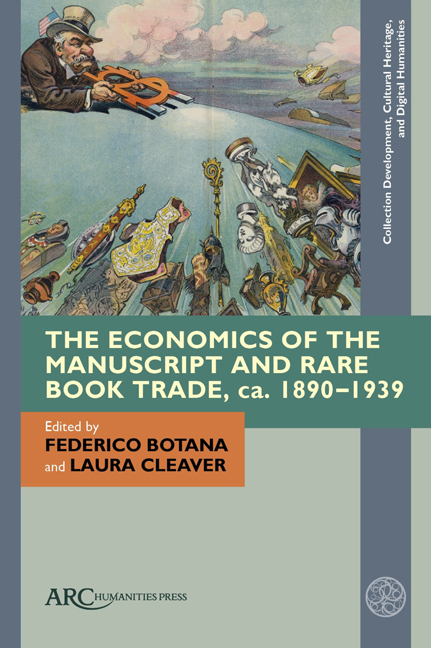Book contents
- Frontmatter
- Contents
- List of Illustrations
- List of Tables
- Acknowledgments
- Abbreviations
- Introduction. The Value of Rare Books
- Chapter 1 Valuing Rare Books in 1920s Germany: Prices in Jacques Rosenthal’s Bibliotheca medii aevi manuscripta
- Chapter 2 Leo S. Olschki’s Card Index and Potential Profits
- Chapter 3 Stock-books and Ledgers: J. & J. Leighton and Édouard Rahir and Company ca. 1897–1904 and E. P. Goldschmidt and Company ca. 1925–1933
- Chapter 4 Léopold Delisle, Henri Omont, and the Price of National Collecting: The Medieval Manuscript Acquisitions of the Bibliothèque nationale ca. 1900–1910
- Chapter 5 Herschel V. Jones: Public Collections and Private Investments
- Conclusion
- Appendix 1 Inflation
- Appendix 2 Exchange Rates
Chapter 1 - Valuing Rare Books in 1920s Germany: Prices in Jacques Rosenthal’s Bibliotheca medii aevi manuscripta
Published online by Cambridge University Press: 28 March 2024
- Frontmatter
- Contents
- List of Illustrations
- List of Tables
- Acknowledgments
- Abbreviations
- Introduction. The Value of Rare Books
- Chapter 1 Valuing Rare Books in 1920s Germany: Prices in Jacques Rosenthal’s Bibliotheca medii aevi manuscripta
- Chapter 2 Leo S. Olschki’s Card Index and Potential Profits
- Chapter 3 Stock-books and Ledgers: J. & J. Leighton and Édouard Rahir and Company ca. 1897–1904 and E. P. Goldschmidt and Company ca. 1925–1933
- Chapter 4 Léopold Delisle, Henri Omont, and the Price of National Collecting: The Medieval Manuscript Acquisitions of the Bibliothèque nationale ca. 1900–1910
- Chapter 5 Herschel V. Jones: Public Collections and Private Investments
- Conclusion
- Appendix 1 Inflation
- Appendix 2 Exchange Rates
Summary
ACCORDING TO LATE nineteenth-and early twentieth-century manuals for German booksellers, determining the price of a book was one of the hardest parts of their activity. This task was even more challenging in the case of manuscripts, since they are unique objects. In their handbooks, Hans Blumenthal, Max Paschke, Philipp Rath, and Franz Unger, barely discussed the criteria and methods used to value manuscripts. However, sale catalogues containing descriptions of items offered for sale shed light on some of the booksellers’ tactics in calculating the prices of these books. This study investigates the Bibliotheca medii aevi manuscripta (hereafter BMAM), a two-volume catalogue by the Munich antiquarian bookdealer Jacques Rosenthal presenting for sale 200 medieval manuscripts.
Issued in 1925 and 1928, BMAM makes it possible to explore the activities of a German bookseller at a time when the trade was recovering from the repercussions of the First World War and of the economic crisis caused by hyperinflation in Germany in 1923. Although these events affected Rosenthal’s business (opened in 1895), they had a relatively limited impact, as his clientele comprised customers from around the world, many of whom suffered less than local buyers. Indeed, the economic crisis eventually proved to be a good opportunity for German bookdealers selling rare books, since many libraries belonging to aristocratic and religious owners who were heavily in debt entered the market in the mid-1920s. Between 1924 and 1930, Rosenthal’s stock was the basis for a series of catalogues offering numerous incunables, manuscripts, and illustrated books. Thus, the publication of BMAM took place when the bookshop was experiencing a period of renewal. This is also apparent from the fact that Rosenthal hired scholars to compile these catalogues, including Ernst Schulz, an expert on medieval history and literature. Schulz’s meticulous entries in BMAM allow for a detailed analysis of various aspects of the books that influenced their prices.
Before evaluating the factors that affected the price of manuscripts, it is worth providing an overview of the prices in BMAM. Printed on individual sheets to accompany the catalogues, two lists contained the sums for which the books were offered, ranging from 100 to 50,000 Reichsmarks. Rosenthal, however, did not include prices for six items, either because he had sold them while printing the catalogues or because he hoped to obtain high sums for them and refrained from discouraging potential clients.
- Type
- Chapter
- Information
- Publisher: Amsterdam University PressPrint publication year: 2024



